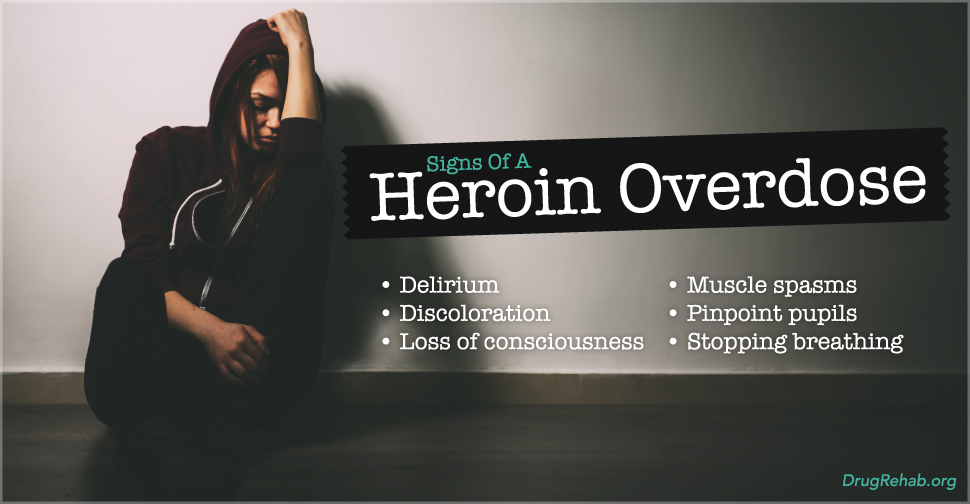
The scope of heroin overdose is far reaching. In the U.S. alone, for instance, 10,500 people died of heroin overdose in the year 2014, according to the U.S. National Library of Medicine. While the majority of people who experience overdose are suffering from addiction, some people may overdose with the first use. Further, many who abuse substances such as heroin may also abuse other substances. Combining substances such as alcohol with heroin can be dangerous and even fatal. Unfortunately, heroin abuse has become more widespread in the last decade. For these reasons, it is important to understand what heroin is, how it affects people and may cause overdose, and the signs of heroin overdose.

Heroin—What Is It?
Heroin is an illegal, opioid drug which is very addictive. Opioids are substances which alleviate pain and produce calming effects. Heroin gives the person abusing it a feeling of well-being and an immediate “rush” of pleasure. The drug appears in pure form as a white powder that is usually snorted, but can appear in other forms and be smoked or injected. Though the immediate effects wear off quickly, heroin may produce a number of short- and long-term adverse health effects.
What Side Effects Are Caused By Heroin?
Individuals affected by heroin abuse may experience a host of side effects and long-term health effects, including overdose. Some of the initial effects may include:
- Dry mouth
- Flushing of skin
- Heavy feeling in limbs
- Nausea
- Severe itching
- Vomiting
After the rush and primary side effects, the person may experience extreme drowsiness and have impaired thinking. Breathing and heart rate will also slow down for several hours, conditions which can lead to more severe problems.
Prolonged heroin abuse may also greatly impact a person’s health. As the National Institute on Drug Abuse states, “repeated heroin use changes the physical structure and physiology of the brain, creating long-term imbalances in neuronal and hormonal systems that are not easily reversed.” Continued abuse may also cause a breakdown of the brain’s white matter, resulting in changes to decision-making, changes in behavior (and the ability to control one’s behavior), and changes in response to stressors. Heroin can also cause “profound degrees of tolerance and physical dependence.” In other words, people affected by heroin abuse may develop a tolerance to its effects or may experience extreme withdrawal symptoms when not taking it.

Perhaps one of the most dangerous side effects of long-term heroin abuse is the risk of forming addiction. Addiction changes a person’s behavior to make the person seek and continue use of a substance, often regardless of the consequences or knowledge that the substance is harmful. Those affected by addiction may also experience cravings which are so severe, that they are often unable to do much else besides seek use of the drug. These urges are frequently what cause people to overdose, as people seek the drug more often, taking higher and more frequent doses, in an attempt to overcome a developed tolerance. This puts people affected by addiction at high risk of overdose.
What Are The Signs Of Heroin Overdose?
How many people are at risk of overdose? Anyone who abuses heroin may be at risk and those who overdose are at high risk of fatal outcomes. The Centers for Disease Control and Prevention (CDC) states that, “between 2000 and 2015, the rate of heroin-related overdose deaths more than quadrupled, and more than 12,989 people died in 2015.” The heroin epidemic is a disease which affects many, and the possibility of heroin abuse resulting in overdose must be recognized. Only with the proper recognition of symptoms and an appropriate diagnosis and care, can people receive the help they need for abuse or addiction.

If a person is undergoing overdose, he or she will display a number of alarming symptoms, which may include the following:
- Constipation
- Delirium
- Discoloration in nails and skin (blue in appearance)
- Discoloration in tongue
- Disorientation
- Extreme drowsiness
- Fainting
- Loss of consciousness
- Low blood pressure
- Muscle spasms
- Slow to weak pulse
- Small to extremely small pupils (pinpoint pupils)
- Stomach or intestinal spasms
- Slow or stopped breathing
In the most severe cases, an overdose may result in a coma, leading to death.
What To Do In Case Of Overdose
In case of overdose, it is best to seek professional medical help right away. Call emergency services, and if instructed, roll the person to the side to prevent choking (in case of vomit). It will be helpful to have the person’s name, age, (approximate) weight, what substance he or she took and the dosage, if possible. Once the person gets medical help, he or she may get blood or urine tests, help breathing, chest scans or x-rays, medications, such as Narcan; and all available care to help restore health.
Finding Treatment
Not everyone who experiences heroin overdose will be ready for treatment, but many need it. Finding an inpatient rehab center with supportive staff, varied treatment methods, including a medically-supervised detox; and individualized care may help a person greatly during the early days of recovery.
To learn more about good rehab facilities, or to speak about your questions and concerns, contact us today at DrugRehab.org.
For More Information Related to “Signs Of A Heroin Overdose” Be Sure To Check Out These Additional Resources From DrugRehab.org:
- How Do People Use Heroin?
- Consequences Of Injecting OxyContin (Oxycodone)
- Understanding A Heroin Use Disorder
- What is Heroin Cut With?
- What Are The Side Effects Of Heroin Use?
Sources
Centers For Disease Control and Prevention— Heroin
National Institute On Drug Abuse — Heroin
U.S. National Library Of Medicine — Heroin Overdose


